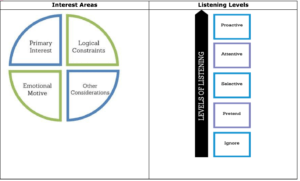The Keys to Deeper and More Trusting Relationships
The following guest post comes from my friend and client Sean Wenham, Vice President at U.S. Bank Private Wealth Management. I hope you find it to be as insightful as I did…
Welcome to my third edition newsletter based on a recent Dale Carnegie program I took, presented by Matt Norman. If your current profession, or personal life, involves conversations and relationships with anybody, then you won’t be wasting your time reading on.
I dare you. Read on.
Prior to the COVID shutdown, I met with Matt Norman to discuss two of the concepts from the program in more depth: Interest Areas and Listening Levels. These diagrams help to frame up the concepts:
Before we get into the concepts, let me ask you: Do you ever think that some of your best qualities can actually be problematic in some situations? I do, but usually after the fact.
For example, perhaps you are successful because you’re an entrepreneurial self-starter, goal-oriented, and focused on achievement. Could that be you? It’s me. These qualities are typically associated with more logical, less emotional personalities. Strong on activity and direction, but maybe not so much in connecting at a deep level.
Despite those tendencies, it is critical for people like us to engage in conversations that move us from the collection of simple data to a dialogue where we gain an understanding of people’s emotions, revealing their motivations and values, and build deeper relationships. For example…
Most everybody has an alma mater and prefers to retire early. But, why did they pick that school? And why retire early?
Ask More and Better Questions
There are three people that have taught me the importance of asking more questions to allow the conversation to be relevant, and deep. Pierre, a CEO at a previous company, told me you won’t learn anything until you ask ‘why’ five times. Simon Sinek published some great material around his theme ‘Start with Why’. Matt Norman presented his insights utilizing the resources of Dale Carnegie, and the two concepts shown above.
If we have simple, surface-level conversations, we will collect basic information and create temporary relationships. While they may satisfy some short-term urge, we will not achieve monumental success in our roles. Without strong relationships, we will certainly not make connections to other important relationships.
These conversations create bonds that allow even more knowledge to flow, and deeper relationships to develop.
The Power of Proactive Listening
Through proactive listening, we can take what we currently hear and turn it into dialog bursting with information. We can consider how words may be dressed in body language and intonation revealing more. Active and engaged listening reveals deeper meaning than the words our ears are simply hearing. There are 5 levels of listening. In our professional role, we must reside in the top two levels of listening to have meaningful relationships with our co-workers, clients, and partners. Being attentive simply opens up the pathways allowing us to expand our connection to include the lower two quadrants of the Interest Areas diagram.
Try it with a colleague in your next casual conversation. Try it with your family.
I remember the first time I learned of Proactive Listening at a Dale Carnegie course years ago. Being a naturally cynical East Coast guy, I instantly rolled my eyes at the term ‘Proactive Listening’. But I listened to the lesson and found tremendous value in its meaning. So, I tried it out. I wrote down numerous questions on my mind that would reveal information I wanted to learn from an upcoming client meeting. Instead of asking the questions directly, I looked for ways to drive the conversation to reveal them in dynamic ways. What I found was a deeper meaning in the conversation revealing those answers. I did check the questions off of my notes as I went, but what I collected was much more information, and my deeper connection to that client was obvious.
Try these simple ideas. First, write down the questions you want to ask your clients, colleagues, and others before you meet them. Look for opportunities to get those questions answered without actually asking the exact written questions. Second, go deeper with your friends and colleagues by asking why, or variations of that simple question. That’s making an emotional connection. Third, and most important, when you talk with someone, engage, listen, be present and undistracted. Not only will you hear more, but they will also sense the engagement and tell you more.
Where can you start building deeper relationships?










Comments are closed here.